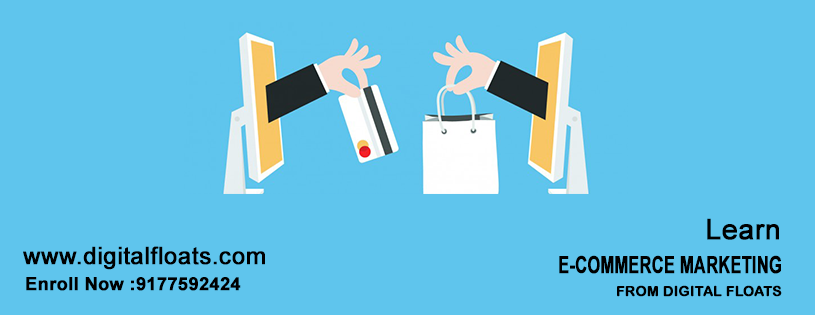Learn e-commerce web marketing skills with case studies and conceptual theory by professionals of our highly reputed e-commerce marketing training section in Digital Floats. Our range of e-commerce courses covers every phase of online retailing strategy and practices.

Are You Looking For E-commerce Marketing Training in Hyderabad?
Welcome to E-Commerce Marketing Training Institute in Hyderabad
E-commerce marketing is an amalgamation of various digital marketing strategies to generate sales by raising awareness of an online store, driving consumer traffic into the website and giving him/her an optimal online experience. The whole marketing process is driven by unique, user-specific data collected from a wide range of sources. The different marketing strategies used as part of e-commerce marketing are:
Search Engine Optimisation: Website traffic generated through search engine results on Google, Yahoo, Bing and so on.
Pay-Per-Click or PPC: Paid ads that appear on the top of search engine results based on search queries that the user makes. The advertiser is charged every time a user clicks the ad.
Display advertising: Visually appealing advertisements such as banner ads that are customized as per the core content of the website.
Affiliate marketing: Referrals generated through blogs, customer reviews, embedded links and even banner ads that take the user to the target site. Affiliate marketers receive a commission if a purchase is made.
Email marketing campaign: Bulk emails, newsletters, notifications from shopping carts that have not made it through the entire purchase process are some of the channels of email marketing. Such emails and notifications are usually auto-generated.E-commerce marketing are practiced by online retailers who use the internet as a platform to sell physical products to customers.
Depending upon their reach, these retail stores might cater to customers within only a limited geographical area or cover national and international locations as well. Irrespective of the coverage, it is crucial for e-commerce stores to have exceptionally strong marketing and management strategies as they have no physical location where prospective customers can walk-in and sales pitches can be made. Therefore, a customer’s decision to buy or leave will be completely based upon his or her online experience and how convincing the store’s branding and marketing strategies are.
E-commerce marketing is practiced by online retailers who use the internet as a platform to sell physical products to customers. Depending upon their reach, these retail stores might cater to customers within only a limited geographical area or cover national and international locations as well. Irrespective of the coverage, it is crucial for e-commerce stores to have exceptionally strong marketing and management strategies as they have no physical location where prospective customers can walk-in and sales pitches can be made. Therefore, a customer’s decision to buy or leave will be completely based upon his or her online experience and how convincing the store’s branding and marketing strategies are.
Branding strategies define what customers feel and experience about a company’s products. Good branding techniques are vital if a company wants to be noticed in the competition and be positioned in the top slots of search engine result pages. When designing e-commerce branding strategies, companies must consider the mission and vision of the business, the uniqueness of the product and the standards which the business complies with. Customer reviews also play an important role in branding.
E-commerce marketing and advertising strategies are plentiful to choose from. Depending on the nature of products, customer base, and geographical reach, e-commerce owners might choose to blend a variety of advertising techniques to entice customers. The most popular of these techniques are video ads; ads on social media sites such as Facebook, where people can set up their own ad campaigns to cover a certain geographical reach with the expectation of a certain number of likes; online catalogs; targeted e-mail campaigns, and so on. Other popular advertising techniques include banners, side-bars and pop-up ads, Google AdWords and pay-per-click or PPC advertising.
Branding, marketing and advertising strategies that drive e-commerce marketing are all based on search algorithms that run as backend applications on Google, Yahoo, and other search engines. Algorithms contain rules and requirements that determine search results. Online marketing trends are continuously evolving by the day, which means e-commerce marketing and advertising techniques too must keep pace. For e-commerce businesses to flourish it is critical that business owners monitor algorithmic developments frequently. That is why the role of an e-commerce marketer is of such extreme importance. It is he who carries the professional expertise in recognizing changing marketing trends and designing e-commerce marketing strategies that can keep up with changing search engine algorithms.
The E-Commerce Marketing Training course offered at Digital Floats, Hyderabad, is guaranteed to furnish students with the necessary e-commerce branding, marketing, and advertising skills keeping in mind the algorithmic standards of all search engines.
At Digital Floats Institute, Hyderabad, students can leverage the knowledge provided through our E-Commerce Marketing Training course to become professional e-commerce marketers of tomorrow.
E-Commerce Course Content
E-Commerce: Overview
- Top 5 E-commerce websites
- What is E-Commerce Marketing?
- E-Commerce Trend in India
SEO for E-Commerce websites
- Importance of Affiliate Marketing in E-Commerce
- E-commerce marketing strategies
Case studies on E-commerce websites
- Understanding E-Commerce Marketing.

